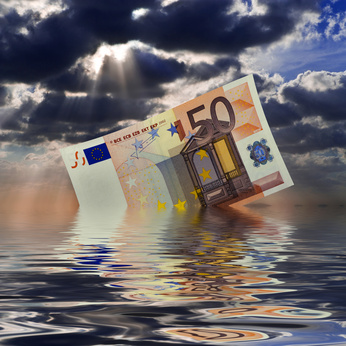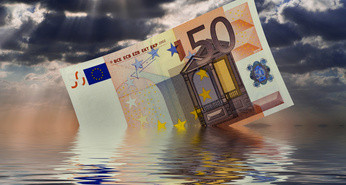After a roller coaster year for Euro/Dollar, 2011 promises to be no less dramatic. The main factors moving the currencies are far from being resolved, and the actions that policymakers and market makers will take are unknown. Full year predictions in forex are from being an exact science, but there’s a general direction.
2010 – EUR/USD loses 6.5%
The short version of 2010: The European debt crisis that began late in 2009 in Greece (still in trouble now), deteriorated and evolved into a full blown crisis in May – EUR/USD bottoms out at 1.1876. A “nuclear” safety net in Europe + strong German growth calm the markets + preparations for a second QE program in the US push the Euro back to the levels it began the year – EUR/USD 1.4282. The Irish crisis sends it back down to close the year at 1.3383.

I’ve been bearish on EUR/USD throughout most of the year, and so have been 5 out of 6 forecasts I’ve quoted at the beginning of 2010. This was definitely a wild and bumpy ride – with sharp movements.
2011 – Spanish debt
The new European stability mechanism won’t help the markets calm down. The stress tests in July proved to be terribly wrong as the Irish banking system collapsed a few months later.
Now, the trouble lays on Europe’s fourth largest country – Spain. Portugal’s problems can be handled with the current bailout fund. Spain is much bigger – its economy is half the size of Germany, and its debt is beyond the capacity of the bailout fund.
And, the Spanish government, at all levels and the banking system have a big load of debt to pay back at the beginning of the year. While the Euro stabilized in the meantime, the bond yields of 10 year notes of Spanish government debt refused to go down – they closed the year at a yield of 5.45% – very high and very far from the benchmark German bunds.
The need to pay and rollover the debt will find Spain in trouble at the beginning of the year, something that could lead to a bailout (280 billion euros?), and could drag another big country – Italy, where political instability and high levels of debt are still far from limelight. Other core countries such as little Belgium and huge France are not sound enough either.
More unity means weaker currency
Another round of the crisis, with the bailout fund not sufficient enough, will force hard decision making on European leaders – while leaving the Euro-zone might be a good economic solution for the debt laden countries and for the Euro currency, it will be a huge political blow to the European project.
I believe that Germany and France, the main drivers of the union, will do whatever they can to preserve everybody inside the EMU, and will dig deeper into their own pockets. Maybe American money from the IMF will help as well.
This burden sharing won’t be popular with the constituencies of these countries, but will be an opportunity to show leadership and to bring the European Union closer together. A weaker Euro will help German exports – which will help the troubled countries.
In the long term, a more tight European Union is politically and economically beneficial, but this will take time be realized – during 2011, the Euro will continue suffering.
US Strength
On the other side of the Atlantic, money is printed by the Federal Reserve. This is supposed to devalue the currency and could bring inflation as well. But the situation in the US is getting better – employment is slowly beginning to move.
The US dollar already enjoys a safe haven status, while the other safe haven currencies – the Swiss franc and the Japanese yen, are overvalued. In times of trouble in Europe, the dollar rises.
Inflation, at least at first, will boost the US dollar- this will trigger rate hikes in the US. At this point, not will the greenback enjoy a safe haven status but will also provide a higher yield.
Bottom line – EUR/USD falls.
What do you think?
